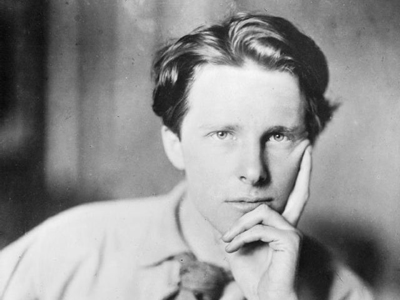
Ask the AI Tutor
Need help with The Inspired Word? Ask our AI Tutor!
AI Tutor - Lucy
Connecting with Tutor...
Please wait while we establish connection

Rupert Brooke.
The Inspired Word
The Inspired Word is about poetry.
The First World War caused suffering to countless millions. The weariness, discomfort and fear of those in the trenches, the agonies of the wounded and the grief of those bereft of their loved ones. But, as is often the case, from the darkest of experiences the finest art is born. Many poems were written by those affected by the war and this quiz is about those writers.
1 .
Which famous writer lost his son in the war? It inspired him to write the line: "If any question why we died, tell them, because our fathers lied."
Thomas Hardy
George Bernard Shaw
Rudyard Kipling
John Masefield
The line is taken from Kipling's Epitaphs of the War, a collection of poems dedicated to those who died during WWI. He is perhaps most famous for his children's stories which include The Jungle Book. He died in London in 1936
2 .
Siegfried Sassoon was a poet who served in the British Army during the war. The death of his friend, David Thomas, drove him to write a letter to his commanding officer in which he refused to return to duty. What happened to Sassoon because of this letter?
He was demoted to Private Soldier
He was hospitalised
He was imprisoned
He was executed
In his letter, Finished with the War: A Soldier’s Declaration, Sassoon said, "I am making this statement as an act of wilful defiance of military authority because I believe that the war is being deliberately prolonged by those who have the power to end it... I have seen and endured the sufferings of the troops and I can no longer be a party to prolong these sufferings for ends which I believe to be evil and unjust."
A year prior to writing this letter Sassoon had been awarded the Military Cross for conspicuous gallantry. It is thought that this is why he was not court marshalled. Instead he was sent to a war hospital, where he was treated for shell-shock. He died in Wiltshire in 1967
A year prior to writing this letter Sassoon had been awarded the Military Cross for conspicuous gallantry. It is thought that this is why he was not court marshalled. Instead he was sent to a war hospital, where he was treated for shell-shock. He died in Wiltshire in 1967
3 .
Sassoon's most famous war poem tells of how a soldier should advance slowly. What is this poem called?
How to charge
How to fight
How to advance
How to die
Here is the poem in full:
Dark clouds are smouldering into red
While down the craters morning burns.
The dying soldier shifts his head
To watch the glory that returns;
He lifts his fingers toward the skies
Where holy brightness breaks in flame;
Radiance reflected in his eyes,
And on his lips a whispered name.
You’d think, to hear some people talk,
That lads go West with sobs and curses,
And sullen faces white as chalk,
Hankering for wreaths and tombs and hearses.
But they’ve been taught the way to do it
Like Christian soldiers; not with haste
And shuddering groans; but passing through it
With due regard for decent taste
Dark clouds are smouldering into red
While down the craters morning burns.
The dying soldier shifts his head
To watch the glory that returns;
He lifts his fingers toward the skies
Where holy brightness breaks in flame;
Radiance reflected in his eyes,
And on his lips a whispered name.
You’d think, to hear some people talk,
That lads go West with sobs and curses,
And sullen faces white as chalk,
Hankering for wreaths and tombs and hearses.
But they’ve been taught the way to do it
Like Christian soldiers; not with haste
And shuddering groans; but passing through it
With due regard for decent taste
4 .
Wilfred Owen was a friend of Sassoon's and probably the most famous of First World War poets. One of his poems, Dulce et Decorum est, translates from which Latin phrase?
How dark and deceitful it is
How sweet and honourable it is
How harsh and cruel it is
How noble and grand it is
Owen's poem describes the horrors of war and ends with the lines:
My friend, you would not tell with such high zest
To children ardent for some desperate glory,
The old lie: Dulce et decorum est Pro patria mori.
The Latin is taken from the first line of a poem written by the ancient Roman writer, Horace. The whole line in English is,
How sweet and honourable it is to die for one's country.
My friend, you would not tell with such high zest
To children ardent for some desperate glory,
The old lie: Dulce et decorum est Pro patria mori.
The Latin is taken from the first line of a poem written by the ancient Roman writer, Horace. The whole line in English is,
How sweet and honourable it is to die for one's country.
5 .
Owen was killed in action in 1918 when he was 25 years old. He was trying to cross the Sambre canal but was shot during the attempt. How long was it from the end of the war when Owen was killed?
One hour
One day
One week
One month
Owen died on 4th November 1918, exactly one week before the armistice which ended the hostilities. The telegram, which broke the news of Owen's death to his parents, reached them on Armistice Day, 11th November 1918
6 .
W. N. Hodgson served as a lieutenant with the Devonshire Regiment during the war. He wrote poetry, which was published in 1916, under what pen-name?
Edward Melbourne
William Adelaide
Harold Sydney
Richard Wellington
Hodgson was awarded the Military Cross for holding a captured trench for 36 hours without reinforcements or supplies during the battle of Loos in 1915. He died in 1916 during the Battle of the Somme, when he was shot in the neck by enemy machine guns. He was aged only 23
7 .
The most often quoted lines from First World War poems is this:
If I should die, think only this of me; That there's some corner of a foreign field that is forever England.
Which poet wrote these words?
If I should die, think only this of me; That there's some corner of a foreign field that is forever England.
Which poet wrote these words?
Winnie River
Paddy Stream
Teddy Burn
Rupert Brooke
The lines, which are often quoted at remembrance services, are taken from Brooke's poem The Soldier. Brooke himself died during the war, though not at the hands of the enemy. He was bitten by a mosquito and the bite became infected. Brooke died on 23rd April 1915, of blood poisoning
8 .
The war poem "In Flanders Fields" was written by the Canadian soldier John McCrae. What did McCrae do for a living before the war?
He was a professor
He was a pilot
He was a musician
He was a fireman
McCrae had studied medicine and was a professor of pathology. During the war he served as a field surgeon and he died of pneumonia whilst still in command of No. 3 Canadian General Hospital in Boulogne. His poem was written after the death of his friend and former student, Alexis Helmer, who was killed in the Second Battle of Ypres
9 .
Edward Thomas was a Welshman and an already-published writer before the war. He was killed only a few months after he arrived in France whilst doing what?
Traversing a minefield
Writing a letter
Advancing across No Man's Land
Lighting his pipe
After a battle, which he had survived, Thomas stood up to light his pipe and was killed by the blast from a late-fired shell. He died on Easter Monday, 9th April 1917. His most famous poem, In Memoriam, has only four lines:
The flowers left thick at nightfall in the wood
This Eastertide call into mind the men,
Now far from home, who, with their sweethearts, should
Have gathered them and will do never again
The flowers left thick at nightfall in the wood
This Eastertide call into mind the men,
Now far from home, who, with their sweethearts, should
Have gathered them and will do never again
10 .
Isaac Rosenberg was a professional writer and artist. During the war he was assigned to a 'bantam battalion'. What was different about the soldiers in a bantam battalion?
They were chosen for their artistic ability
They were shorter than other soldiers
They were chosen for their knowledge of German language
They were taller than most soldiers
Regular soldiers needed to be 5 ft 3in (160 cm) to serve. The army brought in special battalions for those over 5 ft (152 cm) so that they could serve. Rosenberg continued his art and poetry during the war until he was killed in action on 1st April 1918 after returning from a night patrol
**Unlimited Quizzes Await You! 🚀**
Hey there, quiz champ! 🌟 You've already tackled today's free questions.
Ready for more?
Ready for more?
🔓 Unlock UNLIMITED Quizzes and challenge yourself every day. But that's
not all...
not all...
🔥 As a Subscriber you can join our thrilling "Daily Streak" against other
quizzers. Try to win a coveted spot on our Hall of Fame Page.
quizzers. Try to win a coveted spot on our Hall of Fame Page.
Don't miss out! Join us now and keep the fun rolling. 🎉
**Unlimited Quizzes Await You! 🚀**
Hey there, quiz champ! 🌟 You've already tackled today's free questions. Ready for more?
🔓 Unlock UNLIMITED Quizzes and challenge yourself every day. But that's not all...
🔥 As a Subscriber you can join our thrilling "Daily Streak" against other quizzers. Try to win a coveted spot on our Hall of Fame Page.
Don't miss out! Join us now and keep the fun rolling. 🎉






